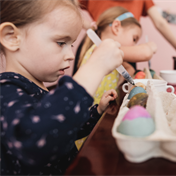
When her little one was born Ayanda* was living with her parents and siblings who were on hand to help. They all pitched in and taught her how to bath, feed and generally take care of her baby. That support was priceless but even so Ayanda’s journey into parenthood wasn’t entirely smooth.
“Before Lebo* was born I felt my parents were disappointed I’d fallen pregnant and I felt pressure from the community,” the 33-year-old single mom says. “Some elders judged me for having a baby before marriage.”
And after giving birth to Lebo (now 12) Ayanda soon discovered that trying to be a good mother was scary.
“I was terrified I wasn’t doing things correctly. Was I overfeeding her? Or what if I squashed her when we were sleeping? I’d read stories about new mothers turning over onto their newborns and accidentally suffocating them.”
Ayanda says she grew up in a happy home with wonderful parents and naturally she wanted the same for Lebo.
“But when things don’t go according to plan you start doubting your instincts and never really know if you’re doing the right thing.”
Watching other moms and dads juggle their duties with apparent ease and grace doesn’t help.
Yet it’s surprising just how many of them are also struggling under the pressure of trying to be the perfect parent.
And that’s at the heart of the matter. From the moment your little one is born you’re expected to undergo a miraculous transformation and somehow become a skilled parent.
In the years to come you’ll face many challenges, ranging from helping your kids with homework to limiting screen time, from teaching them about sex to teaching them good values, from finding time to spend with them to allowing them to develop independence.
It’s one big responsibility that can overwhelm us if we allow it. Experienced parents will tell you to give yourself a break. Yes, we want only the best for our kids and we need to set a good example, but we’re human too and we have to accept we’re never going to be perfect.
Part of the problem is there’s so much advice out there.
“It can sound as if there are certain methods or formulas we need to follow to produce a well-adjusted child,” says Nompumelelo Kubeka, a clinical psychologist based in Johannesburg. “The trouble is if we judge parents by these expectations we’re likely to be disappointed.”
Kubeka points to the theories of British paediatrician and psychoanalyst Donald Woods Winnicott, who came up with the concept of the “good-enough parent”. His theory says parents actually do their kids a favour if they fail them in certain ways – not the big ones, obviously, but little “failures” are necessary.
The process of becoming a good enough parent to our kids happens over time. Initially we’re there for them every time they cry or need food, a nappy change or simply a hug, and this makes them feel secure and cared for.
But it’s not possible to be there for them in the same way throughout their childhood. At some point we’re bound to fail them in some way.
The good news is if we fail them occasionally – such as by not responding immediately to crying – they begin to learn that not everything revolves around them and that the world can be a disappointing place. They also learn that despite the frustration they’ll be fine.
What’s more, being a so-called perfect parent might actually harm your kids – if they’re wrapped in cotton wool and never experience sadness or irritation they’ll struggle to cope with life.
So by being human and making mistakes parents are actually teaching their kids to be resilient. And that’s why good enough is probably best.
“Because there’s no such thing as a perfect parent there’s no manual for parenting,” Kubeka says.
“Good-enough parenting develops as both the parent and child learn to feel secure, valued, happy and successful.”
The quest to be a perfect mother probably does more damage than good, says Sarah Schoppe-Sullivan, a professor of human sciences and psychology at Ohio State University in the US.
Her research shows mothers are less confident when they worry about what others think about their parenting abilities.
Social media has made things even worse – we now get to look at people’s perfect family lives all the time and we tend to judge ourselves in comparison. We know Facebook posts don’t necessarily reflect reality but we ignore that and feel bad anyway.
A 2016 study by Baby Dove Real Mothers Heard and the 2017 Edelman Intelligence survey found 84% of moms believe the stereotype of the “perfect mom” is an outdated standard but nine out of 10 still feel pressure to be perfect. In other words, we’re piling the pressure on ourselves even though we know it’s wrong.
As Schoppe-Sullivan says, the best thing we can do for our kids and ourselves is allow us to be imperfect.
* Not their real names.




 Publications
Publications
 Partners
Partners
















